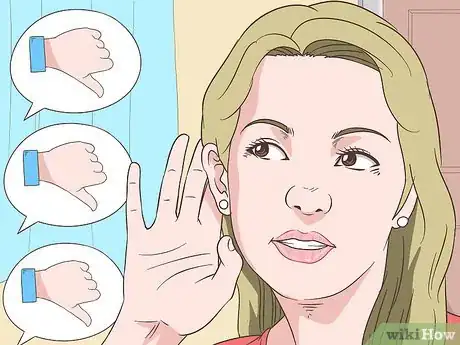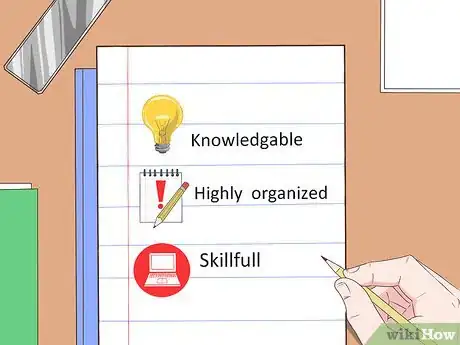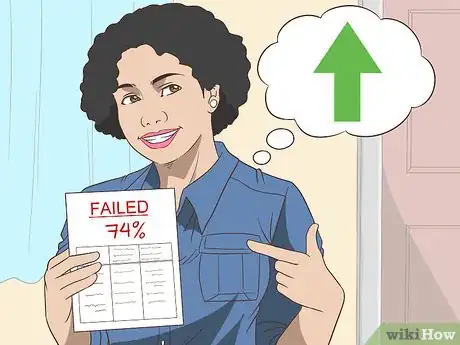This article was co-authored by Dawn Smith-Camacho. Dawn Smith-Camacho is the Owner of Whole Life Solutions, a business in which Dawn provides professional speaking on effective decision-making and navigating major changes for entrepreneurs and employees. She also supports individual coaching clients by identifying their core values, managing time, prioritizing, and honing in on their ideal path. Her clients include Vistage, UNICEF, the Los Angeles Police Department (LAPD), the Wedding Industry Professionals Association (WIPA), NACE, and Oracle.
There are 14 references cited in this article, which can be found at the bottom of the page.
wikiHow marks an article as reader-approved once it receives enough positive feedback. In this case, 100% of readers who voted found the article helpful, earning it our reader-approved status.
This article has been viewed 164,932 times.
Pride and self-confidence come from healthy self-esteem, the positive beliefs that you hold about yourself, your talents, and your accomplishments. Low self-esteem can cause you to feel bad about yourself. Low self-esteem can also make it hard to feel proud of yourself, and may even cause serious mental health issues.[1] To improve your ability to feel proud of yourself, you can use some simple strategies to challenge negative thoughts and build up your confidence.
Steps
Challenging Negative Thoughts
-
1Identify something that you are grateful for. Comparing yourself to others is a common type of negative thinking. This practice can make it hard to feel any pride in yourself. If you notice that you are comparing yourself to others, it might help you to stop for a moment and identify something that you are grateful for.[2]
- For example, when searching for something to feel grateful for, you might identify your good health or a loyal friend. Focus on this thing or person for a few minutes to get yourself into a more positive mindset. Consider why you so are grateful for this thing or person.
-
2Move away from the source of your negative thoughts. Sometimes a simple change of scenery might help you to stop thinking negative thoughts. If you have been stuck in a negative rut for a while, get up and go somewhere else.
- For example, you could try taking a walk outside or sitting in a different room of your house for a while.[3]
Advertisement -
3Remind yourself that everyone has flaws. Sometimes negative thoughts may stem from a belief that you have flaws and no one else does. Try to remind yourself that everyone has flaws, even if you cannot see them.[4]
- For example, an office mate might seem like she has it all, but that person might be dealing with some serious personal issues that you know nothing about.
- Try not to beat yourself up over your flaws. Even if there are things you might like to change about yourself, throwing guilt in the mix isn't going to be helpful.[5]
-
4Stand up for yourself. No one has the right to hurt, insult, or intimidate you. If you are being bullied or criticized in a way that is interfering with your pride, then you may need to reach out to someone such as a teacher, counselor, or human resources manager to stand up for yourself.
- Remember that people who bully and criticize others often do so because they are insecure about themselves. Realizing that someone who is picking on you may be lashing out because of their own person pain and problems may help you to cope with it a bit better.[6] The criticism is not so much about you, then, as it is about their own feelings of inadequacy.
-
5Learn to accept constructive criticism. Although you should defend yourself against insults, it is important to be open to constructive criticism. Criticism can be hard to hear, even when it is constructive. Learning how to accept and respond to constructive criticism can help you to improve yourself and this can be a great source of pride.[7]
- Try to suppress your first reaction when getting criticism. Thank the person. Then, face what they have said head on. Spend some time over one or two days considering the criticism. Ask yourself what you can learn from the criticism?
- Say that you get an essay back from a professor. You are hurt to find that your grade is a C- and that the instructor says your “ideas are hard to follow.” Rather than becoming angry, reread the paper with a fresh mind. It seemed clear enough when you wrote it. Is it still clear on a second read? Try to understand the criticism rather than pushing it away.
-
6Turn negative thoughts into productive questions. Black and white, worst case scenario thinking is not rational or good for you. But you can make negative thoughts into productive questions that will help you to grow and succeed. The next time that you have a negative thought, try turning it into a question that will help you to work towards a goal.
- For example, if you find yourself thinking, “I’ll never find a new job,” stop and challenge that thought. It's not a fact, and it is coming from an unreliable source (your anxiety). Instead of accepting this negative thought, turn it into a question, such as, “What can I do to give myself the best chance of getting an interview?”[8]
-
7Stay away from negative people. Put space between yourself and people who are often critical or negative about you. If possible, try to avoid these people and surround yourself with positive people instead. Sometimes it might not be possible to avoid a negative person, such as your boss or a close family member. In those cases, you may need to build yourself up before or after an encounter with the person.[9]
- Try positive self-talk. Before or after an encounter with a difficult person, it might help you to look yourself in the mirror and give yourself a compliment. For example, you could say something like, “You are smart, capable, and hard-working!”
-
8Seek the help of a therapist. If you find that overcoming negative thoughts is a constant struggle, talk to a licensed mental health professional. You might need some guidance to help you work through problems and to feel better about yourself. A therapist can help you to overcome negative thinking and may also help you to determine if you are depressed or struggling with a different mental health issue.
Building Yourself Up
-
1Visualize yourself succeeding. Visualizing yourself succeeding at something may also help to boost your confidence. Try to think of a time when you did feel confident and self-assured and recreate that moment in your head. Or, imagine yourself succeeding at something that you hope to achieve. You can repeat this process any time that you need a boost of confidence.
- Make sure that you imagine yourself succeeding with as much detail as possible. How do you look? Who else is there? How do you feel? What do you say?[10]
-
2Stand up straight and walk with confidence. The way that you carry yourself can make a big difference in how confident you feel.[11] Try to stand up as straight as you can and maintain good posture when you walk as well. To maintain good posture, it might help you to imagine that you are balancing something on your head as you walk.
-
3Dress up. The way you feel about how you look can affect your confidence, so dress in clothes that make you feel good about your appearance.[12] Choose clothes that fit well, flatter your body, and are of good quality.
- Try to dress in clothes that suit the occasion as well. For example, if you are going to a job interview, then a suit or wear-to-work dress would make you feel more confident than a t-shirt and jeans.
-
4Keep a success journal. Focusing on the good parts of your life can help you to feel more confident and happy as well. Take a few minutes each day to write down something that went well for you. For example, you might write down a recent accomplishment and the skills that you’ve used to deal with hard situations.[13]
-
5Make a list of your strengths and achievements. It might help you to make a list of all of your achievements, even ones that you may consider minor. People who lack self-confidence often focus more on failures than accomplishments, so it might be helpful to force yourself to look at the positives sometimes.
- Think about why you are proud of these accomplishments as well. Identifying the reasons why some things make you feel proud may help you to feel proud when you have other similar accomplishments.[14]
-
6Share your accomplishments now and then. Telling others about something that you did that made you feel proud is a healthy way to show your pride and gain support from others as well. Taking a moment to share your accomplishments now and then will make you feel better about yourself and may help to take your mind off of what other people might think of you.[15]
- For example, you could post a photo of yourself holding an award that you received for your grades or tell your friends at the gym that you improved your mile time.
-
7Use hopeful statements to build yourself up. Try to treat yourself with kindness rather than beating yourself up all of the time. For example, if you have a presentation coming up that has you worried, don’t tell yourself things like “I am going fail.” Instead, tell yourself something like, “This is going to be difficult, but I know that I can handle it.”[16]
- Also, remember that you are probably much tougher on yourself than you need to be. For example, you may beat yourself up for losing your place during a presentation, but your peers won’t care and may not even have noticed.[17]
-
8Forgive yourself. Remember that it is important to forgive yourself when you make a mistake. Refusing to forgive yourself can interfere with your ability to be proud of yourself, so try to forgive yourself as soon as possible.[18]
- For example, rather than blaming yourself, try to tell yourself something like, “I made a mistake, but that’s okay. I am still a smart, capable person.”
-
9Encourage yourself to do better. To stay proud of yourself even when things do not go your way, you will need to get into the habit of encouraging yourself. If something does not go the way that you had planned, try to readjust your expectations and encourage yourself to do better next time.
- For example, if a school project does not get the grade that you hoped for, you might tell yourself something like, “My project wasn’t perfect but the other students still seemed interested and asked questions. That means that I met my basic goal.”[19]
- Be patient with yourself. Making changes can take time, so just keep trying to do a little better each day.[20]
Expert Q&A
-
QuestionHow can I be proud of myself when no one else is?
 Dawn Smith-CamachoDawn Smith-Camacho is the Owner of Whole Life Solutions, a business in which Dawn provides professional speaking on effective decision-making and navigating major changes for entrepreneurs and employees. She also supports individual coaching clients by identifying their core values, managing time, prioritizing, and honing in on their ideal path. Her clients include Vistage, UNICEF, the Los Angeles Police Department (LAPD), the Wedding Industry Professionals Association (WIPA), NACE, and Oracle.
Dawn Smith-CamachoDawn Smith-Camacho is the Owner of Whole Life Solutions, a business in which Dawn provides professional speaking on effective decision-making and navigating major changes for entrepreneurs and employees. She also supports individual coaching clients by identifying their core values, managing time, prioritizing, and honing in on their ideal path. Her clients include Vistage, UNICEF, the Los Angeles Police Department (LAPD), the Wedding Industry Professionals Association (WIPA), NACE, and Oracle.
Career & Life Coach Try writing down what you're grateful for each day in a gratitude journal. Over time, this can help you develop a more positive, grateful mindset. If you're still feeling negative, ask yourself whether your negative thoughts are the result of other people's expectations or criticism. If so, remind yourself that ultimately, you're the one who knows what's right and wrong for yourself.
Try writing down what you're grateful for each day in a gratitude journal. Over time, this can help you develop a more positive, grateful mindset. If you're still feeling negative, ask yourself whether your negative thoughts are the result of other people's expectations or criticism. If so, remind yourself that ultimately, you're the one who knows what's right and wrong for yourself. -
QuestionHow can I change negative thoughts about myself?
 Dawn Smith-CamachoDawn Smith-Camacho is the Owner of Whole Life Solutions, a business in which Dawn provides professional speaking on effective decision-making and navigating major changes for entrepreneurs and employees. She also supports individual coaching clients by identifying their core values, managing time, prioritizing, and honing in on their ideal path. Her clients include Vistage, UNICEF, the Los Angeles Police Department (LAPD), the Wedding Industry Professionals Association (WIPA), NACE, and Oracle.
Dawn Smith-CamachoDawn Smith-Camacho is the Owner of Whole Life Solutions, a business in which Dawn provides professional speaking on effective decision-making and navigating major changes for entrepreneurs and employees. She also supports individual coaching clients by identifying their core values, managing time, prioritizing, and honing in on their ideal path. Her clients include Vistage, UNICEF, the Los Angeles Police Department (LAPD), the Wedding Industry Professionals Association (WIPA), NACE, and Oracle.
Career & Life Coach The first thing you should do is to stop beating yourself up, because throwing guilt in the mix doesn't tend to be especially helpful. Just try to replace those negative thoughts with positive ones when you catch them, but be patient with yourself, because it's a process, like everything else.
The first thing you should do is to stop beating yourself up, because throwing guilt in the mix doesn't tend to be especially helpful. Just try to replace those negative thoughts with positive ones when you catch them, but be patient with yourself, because it's a process, like everything else.
References
- ↑ https://www.mind.org.uk/information-support/types-of-mental-health-problems/self-esteem/about-self-esteem/#.VhV_QPlVhBd
- ↑ http://psychcentral.com/blog/archives/2011/10/30/6-tips-to-improve-your-self-esteem/
- ↑ http://www.becomingminimalist.com/compare-less/
- ↑ http://psychcentral.com/blog/archives/2011/10/30/6-tips-to-improve-your-self-esteem/
- ↑ Dawn Smith-Camacho. Career & Life Coach. Expert Interview. 13 May 2020.
- ↑ https://www.psychologytoday.com/blog/maybe-its-just-me/201012/dont-project-your-feelings-inadequacy-others
- ↑ https://www.psychologytoday.com/blog/thicken-your-skin/201504/curious-criticism-or-do-you-get-defensive
- ↑ http://psychcentral.com/blog/archives/2014/05/21/3-tips-for-dealing-with-anxious-thoughts/
- ↑ http://www.simplypsychology.org/stress-management.html
- ↑ https://www.psychologytoday.com/blog/flourish/200912/seeing-is-believing-the-power-visualization
- ↑ http://www.sciencedaily.com/releases/2009/10/091005111627.htm
- ↑ https://www.psychologytoday.com/blog/hide-and-seek/201205/building-confidence-and-self-esteem
- ↑ http://www.mayoclinic.org/healthy-lifestyle/adult-health/in-depth/self-esteem/art-20045374
- ↑ https://www.psychologytoday.com/blog/the-couch/201410/secret-way-improve-your-self-esteem
- ↑ https://www.psychologytoday.com/blog/fulfillment-any-age/201201/the-healthy-side-narcissism
- ↑ http://www.mayoclinic.org/healthy-lifestyle/adult-health/in-depth/self-esteem/art-20045374
- ↑ http://www.mayoclinic.org/healthy-lifestyle/adult-health/in-depth/self-esteem/art-20045374
- ↑ http://www.mayoclinic.org/healthy-lifestyle/adult-health/in-depth/self-esteem/art-20045374
- ↑ http://psychcentral.com/blog/archives/2011/10/30/6-tips-to-improve-your-self-esteem/
- ↑ Dawn Smith-Camacho. Career & Life Coach. Expert Interview. 13 May 2020.
About This Article
You can be proud of who you are by standing up straight and walking with confidence, which can actually make you feel better about yourself. To feel better about your outward appearance, choose clothes that flatter your body and show off your unique personality! If you’re still feeling down, try writing down a list of your strengths and achievements to remind yourself of qualities that you’re proud of. Sometimes, making a mistake can stop you from being proud of yourself. But instead of beating yourself up, try to forgive yourself by remembering that everyone makes mistakes, and you’re still a smart, capable person. To learn how to avoid negative people that stop you from being proud of who you are, read more from our Mental Health co-author.
















































































